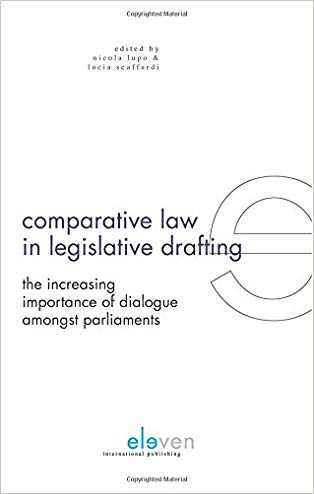 This volume examines whether contemporary parliaments use foreign and comparative law in the legislative process. The research reports covered in this book apply the same methodological approach, focusing on the information apparatus available to the legislators and on the rules and practices that regulate the drafting and approval of bills. Subsequently, it examines several examples of recent legislation in which foreign law has been taken into consideration: in an explicit or implicit way, in order to be accepted or refused, according to a mere instrumental aim or following a rigorous comparative methodology. Contributions are from experts in the field covering the following jurisdictions: the UK, USA, Canada, Australia, European Union, Israel, Italy, Spain, Romania, South Africa, Portugal, Brazil, Namibia and China. They give valuable insights into how legal transplantation and synthesis take place and whether it is a coherent and valuable practice.
This volume examines whether contemporary parliaments use foreign and comparative law in the legislative process. The research reports covered in this book apply the same methodological approach, focusing on the information apparatus available to the legislators and on the rules and practices that regulate the drafting and approval of bills. Subsequently, it examines several examples of recent legislation in which foreign law has been taken into consideration: in an explicit or implicit way, in order to be accepted or refused, according to a mere instrumental aim or following a rigorous comparative methodology. Contributions are from experts in the field covering the following jurisdictions: the UK, USA, Canada, Australia, European Union, Israel, Italy, Spain, Romania, South Africa, Portugal, Brazil, Namibia and China. They give valuable insights into how legal transplantation and synthesis take place and whether it is a coherent and valuable practice.
 This volume examines whether contemporary parliaments use foreign and comparative law in the legislative process. The research reports covered in this book apply the same methodological approach, focusing on the information apparatus available to the legislators and on the rules and practices that regulate the drafting and approval of bills. Subsequently, it examines several examples of recent legislation in which foreign law has been taken into consideration: in an explicit or implicit way, in order to be accepted or refused, according to a mere instrumental aim or following a rigorous comparative methodology. Contributions are from experts in the field covering the following jurisdictions: the UK, USA, Canada, Australia, European Union, Israel, Italy, Spain, Romania, South Africa, Portugal, Brazil, Namibia and China. They give valuable insights into how legal transplantation and synthesis take place and whether it is a coherent and valuable practice.
This volume examines whether contemporary parliaments use foreign and comparative law in the legislative process. The research reports covered in this book apply the same methodological approach, focusing on the information apparatus available to the legislators and on the rules and practices that regulate the drafting and approval of bills. Subsequently, it examines several examples of recent legislation in which foreign law has been taken into consideration: in an explicit or implicit way, in order to be accepted or refused, according to a mere instrumental aim or following a rigorous comparative methodology. Contributions are from experts in the field covering the following jurisdictions: the UK, USA, Canada, Australia, European Union, Israel, Italy, Spain, Romania, South Africa, Portugal, Brazil, Namibia and China. They give valuable insights into how legal transplantation and synthesis take place and whether it is a coherent and valuable practice.